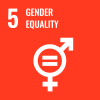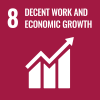Pattaya, 15 May 2023 – Assigned male at birth, Ice* knew from a very young age that she was different from other children.
“I used to look at myself in the mirror and question why I didn’t have a female’s body,” she says.
Feeling different from the conventional gender norms came with its consequences, especially in a small village in Lao People’s Democratic Republic where acceptance of diverse gender was rare, including from her family.
“Whenever I tried to express myself by wearing colourful dresses and makeup, my father would shun me. He expected me to be a straight man and the breadwinner for the family.”
Scared and ostracized, she confided in her friend who was a transwoman working in Thailand, which is a generally more welcoming and inclusive country toward Lesbian, Gay, Bisexual, Transgender, Intersex and Queer people (LGBTIQ+).
“She inspired me a lot. She was always happy, dressed beautifully and wore pretty makeup,” says Ice. With hopes of embodying a life like her friend’s, she moved to Thailand.

Many LGBTIQ+ migrants move to Thailand in search of greater freedom to express themselves. Photo: IOM/Javier Vidal
Her migration journey was far from smooth. Lacking knowledge about the migration process, she soon fell into debt with her travel agent, unable to pay back her transportation costs. She worked in a restaurant in Chonburi province for several years, trying to pay off her loan while facing challenging working conditions.
“My employer would not pay me my monthly salary, saying the sales were low. They gave me the same excuse for months, and I had to make ends meet with the few tips I earned.”
Realizing she was unable to repay her debt, Ice quit her job at the restaurant and started working in the entertainment industry in Pattaya. This enabled her to pay off her debt and provide for her family through sending remittances back home. Despite being able to make her own living, the cycle of discrimination did not stop.
“I remember when going to hospitals for regular health check-ups, the staff would assume that I have HIV/AIDs based on how I looked,” Ice says about her struggle to access health-care services.
“Thankfully, my colleague introduced me to Sisters Foundation, where I was not only able to access health-care services but also able to learn about my basic rights as a migrant worker. I started to meet more people like me. They gave me hope that I could become the woman I am now.”

IOM and Sisters Foundation engage migrant workers, including LGBTIQ+ migrants, in an information session on labour rights. Photo: IOM/Rachaphon Riansiri
Sisters Foundation is a first-of-its-kind non-government organization in the country, established by LGBTQI+ people and providing health-care services and labour rights awareness to others within the community.
Since 2020, the International Organization for Migration (IOM) has been working with Sisters Foundation to provide education sessions on labour rights and professional skills training to LGBTQI+ migrants, to enhance their livelihood and employment opportunities and promote safe migration.
“Migration is a complex phenomenon, thus advocating for the rights of LGBTIQ+ migrant workers can be challenging,” says Rawitcha Sukdipreechakul, Sisters Foundation Project Coordinator.
“Fearing apprehension, many migrant workers hesitate to access services, even in times of labour rights violations. The contributions of these workers often go unrecognized due to discrimination. Together with IOM, we aim to combat stigma and engage LGBTIQ+ migrants in programmes aimed at maximizing their potential.”
“All migrant workers, regardless of their gender, contribute to strengthening the social and economic fabric of our communities,” says Géraldine Ansart, IOM’s Chief of Mission in Thailand. “Through skills development, we hope to facilitate the resilience and economic empowerment of LGBTQI+ migrants.”
IOM and Sisters Foundation also organized a meeting with employers from the entertainment, service and manufacturing industries. Employers exchanged best practices in promoting inclusive policies and addressing risks faced by migrant workers, including LGBTIQ+ migrants.
“Our company thrives on diversity. When migrant workers are equipped with adequate skills, it not only drives the growth of the Thai economy but also enables them to transfer these skills back to their home countries,” shares a representative from Damoa Electronics (Thailand) Co. Ltd.

IOM and Sisters Foundation organized a training on nail painting for migrant workers in Pattaya. Photo: IOM 2022
“Though filled with challenges, migration has been my gateway to freedom,” Ice says. Coming from a small village and not having any money to pay even for transportation, today she is able to buy a house and provide for her family back home.
“I love the skills training sessions, especially nail painting, make-up and baking classes. It allows me to better connect with my community and gives me greater purpose, striving toward a brighter future,” she adds.
Using the skills gained through these IOM-supported occupational trainings, Ice dreams of one day opening her own café back home. With her love for baking and making coffee, she hopes that her customers will feel the warmth and acceptance that she has traversed across countries to find.
“Like everyone, I want to be loved and accepted for who I am. I want to belong. We are all born equal, and we all deserve to be treated that way."
Ice is one of 65 LGBTIQ+ migrant workers (as of April 2023) in Thailand who have benefited from skills development through IOM’s Poverty Reduction through Safe Migration, Skills Development and Enhanced Job Placement (PROMISE) programme, a regional initiative aimed at increasing migrant workers’ access to gainful employment and enhanced protection.
*Name has been changed to protect the identity.
**LGBTIQ+ is an acronym for lesbian, gay, bisexual, transgender, intersex and queer. The plus sign is inclusive of individuals with diverse sexual orientations, gender identities, gender expressions and/or sex characteristics who use other terms or no terms to describe themselves.
This story was written by Anushma Shrestha, IOM’s Associate Communications Officer in Thailand.



